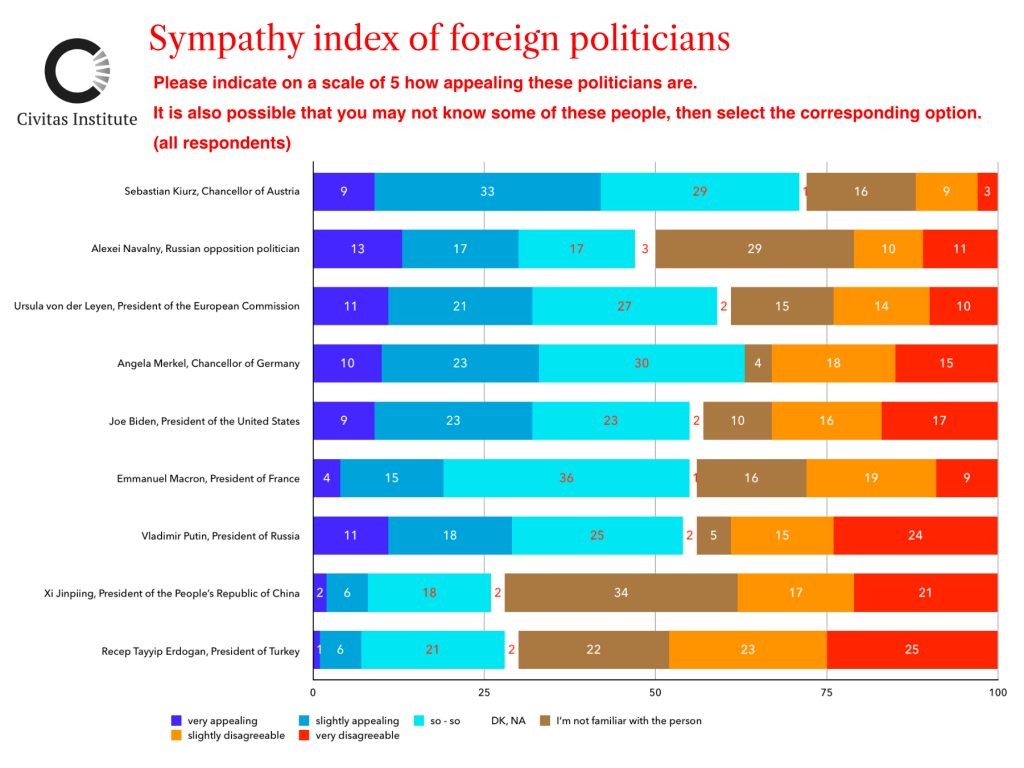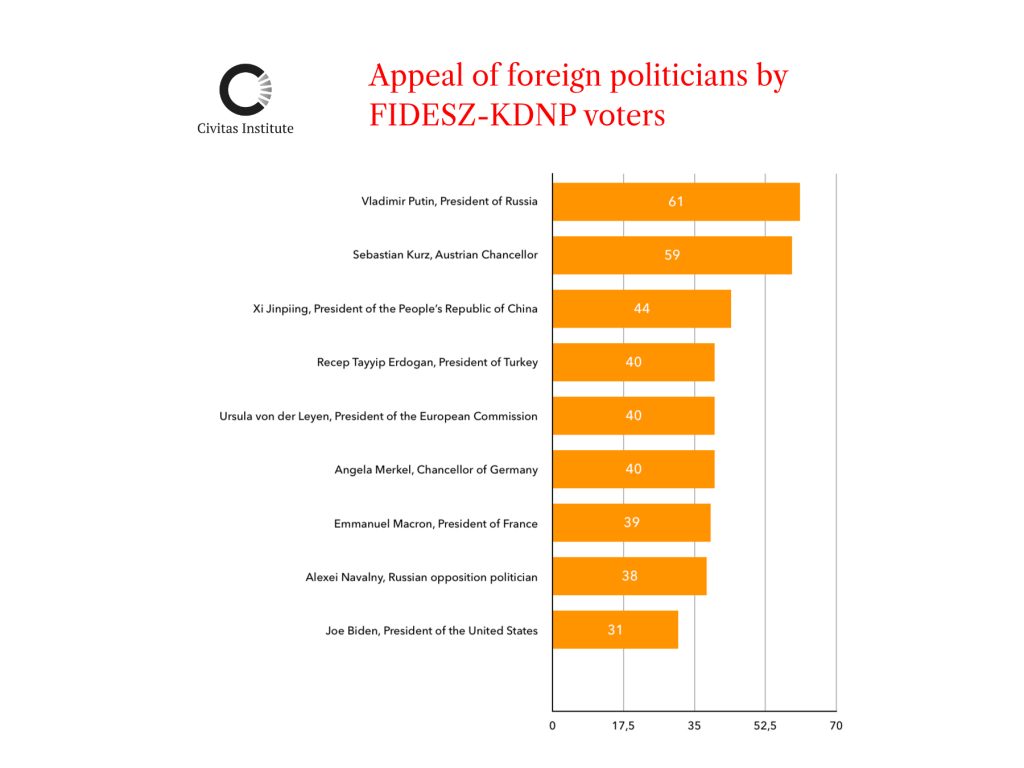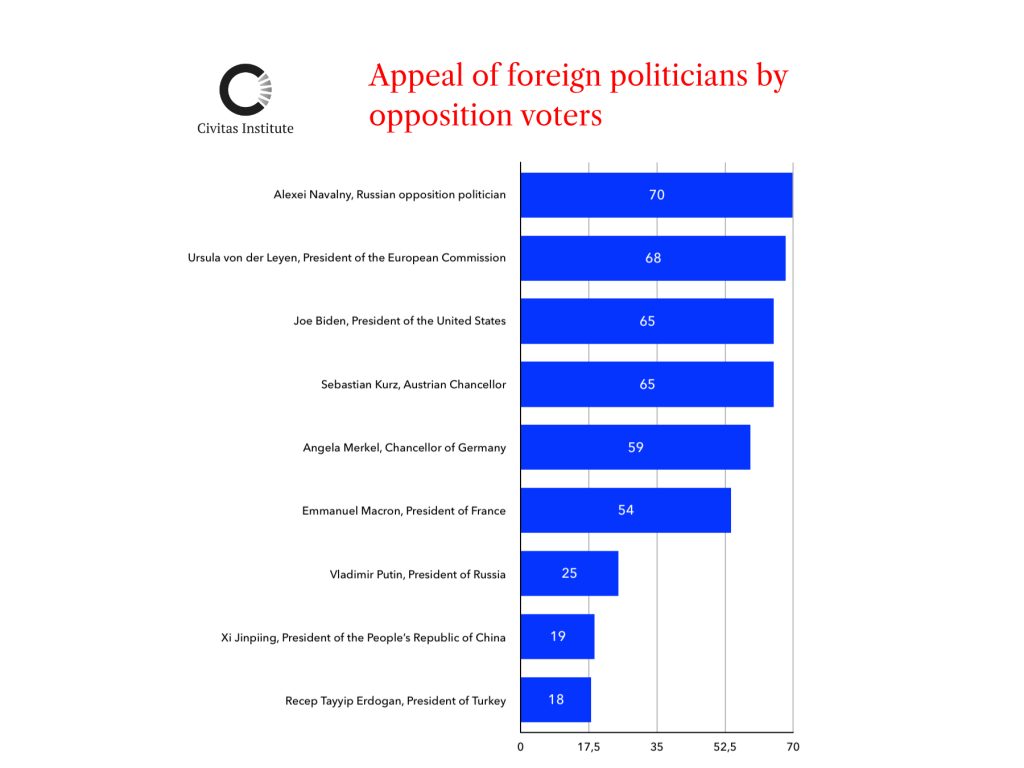The latest Civitas Institute poll measured the sympathy index of foreign politicians in Hungary. The results give a great overview of the ideological differences between pro-government and opposition voters. The perception of some of the most important global political figures could not be more contrarian between Hungarians supporting Viktor Orbán’s government and those opposing it.
Podcast talk: Zoltán Kész and Balázs Csekő
Austrian Chancellor Sebastian Kurz is the most popular foreign politician in Hungary, Turkish President Recep Tayyip Erdogan the least. Joe Biden, Emmanuel Macron and Vladimir Putin are in a virtual dead heat. This is how we could briefly sum up the Civitas Institute Poll measuring the sympathy index of foreign leaders.
Just by looking at the data, the simplest conclusion we can draw is that generally “western” politicians are viewed as more appealing compared to their “eastern” counterparts. The only exception is Alexei Navalny, who is technically from the East, but still represents western ideologies. However, the big picture is different from what we see when it comes to sub-groups of Hungarian voters.
Domestic support for specific political parties is not secondary when it comes to the respondents’ views on foreign politicians, as these views are normally constructed through the domestic parties.

Fidesz-KDNP voters
Russian president Vladimir Putin is the most popular foreign politician among Fidesz-KDNP supporters. Pro-government voters view eastern politicians more appealing than their western counterparts. “Strong men” like the President of Russia, Xi Jinping, and Recep Tayyip Erdogan have a higher sympathy rate within the Fidesz electorate than many democratically-elected western leaders. The only exception is Austria’s Chancellor Sebastian Kurz.
Sebastian Kurz is still presented in a positive light by the Hungarian pro-government media, because of a good relationship between him and Hungarian prime minister Viktor Orbán since the times in the European People’s Party. Nevertheless, Kurz could get soon legal, and as a consequence political, difficulties as he is currently facing charges on false testimony.
Pro-government supporters might be exaggerated by the Orbán administration’s “Eastern Opening” foreign trade policy, the covid19 vaccine program, and a polarized social media campaigning.
It is worth noting that among Fidesz voters, US President Joe Biden is by far the least popular politician on the global political stage. This should not come as a surprise since the Orbán government clearly took the side of Donald Trump at the last US Presidential election, activated several ads attacking Joe Biden, and shunned the Democratic Party.
Zoltán Kész, Director of Operations at Civitas Institute, summed up the poll results with the following words: “30 years ago, Fidesz voters said “Tovarisi Konec”, now the same voters say ‘Welcome Comrade Putin’”.

Opposition voters
The data from opposition voters is almost the exact opposite of the one by the Fidesz voters. Opposition supporters share negative feelings towards eastern authoritarian leaders and favor positions represented by the European Union and the United States.
Russian opposition leader Alexei Navalny, who, for many Hungarians is a strong symbol of the resistance against a system of oppression, is leading the sympathy index among the opposition voters. Navalny’s position, just like Putin’s among pro-governments supporters, shows the heavy influence of Russian politics on Hungary and reveals that supporters of the opposition yearn for a similar figure in Hungarian politics. However, this figure is still missing, the upcoming opposition primary could help create an iconic opposition leader even before the 2022 Hungarian parliamentary election.
The popularity of Xi Jinping and Recep Tayyip Erdoğan is extremely low. A clear sign for a sweeping rejection of the ideas of the Chinese and the Turkish leaders.

Conclusion
One country, two parallel worlds. Hungarian voters are heavily influenced by domestic party preferences when it comes to the sympathy of foreign leaders. Just like in Hungarian domestic party politics, also in this question, there is a clear division between voters supporting authoritarians and those having a democratic worldview.
While it’s no surprise that the opposition aligns itself with the west, however, it is strange how the government still poses as a NATO ally and Euro-Atlantic partner on the international scene, while communicating the exact opposite in its domestic campaigns. So far, as the results of the poll indicate, quite effectively.
Sympathy index: The survey asked respondents on a five-point scale how much they liked the politicians they were asked about. The five-point scale was projected onto a 100-point scale for ease of interpretation as follows: not at all appealing=0 points, rather not appealing=25 points, so-so=50 points, rather appealing=75 points, very appealing=100 points.
Cover photo credit: Reuters
Take a look at the complete poll by clicking here.



